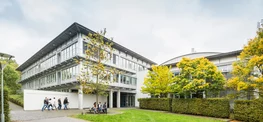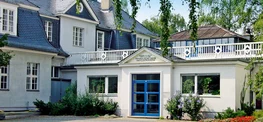The Department of Design and Communication at the University of Southern Denmark in Kolding invites applications for a PhD fellowship. The position is available from 1 September 2022 or as soon as possible thereafter.
The Department of Design and Communication comprises research, study programs and knowledge dissemination within the fields of Participatory Design, Social Design and Design Culture, Information Science, International Business Communication, Library Science, Tourism, Interaction and Technology among others. For more information, please visit www.sdu.dk/idk. The PhD fellowship is a unique opportunity to propose a research project within these research areas combined with one or more of the strategic fields within the department:
- Learning computational thinking
- Sustainability and environmental humanities
- A humanistic approach to participatory entrepreneurship
Further information is available from Head of Department Marianne Wolff Lundholt at phone: +45 6550 1339, email: malu@sdu.dk
Application, salary and conditions of employment etc.
A PhD Fellowship is a three-year position. Employment ends automatically by the end of the period. The holder of the fellowship is not allowed to have other paid employment during the three-year period.
The successful applicant will be employed in accordance with the Protocol on PhD Research Fellow signed by the Danish Ministry of Finance and AC (the Danish Confederation of Professional Associations) of 10 November 2015, enclosure 5, Cirkulære om overenskomst for Akademikere i staten 2019 (the document only exists in Danish).
To qualify for a PhD position, you must have completed a relevant master's degree with a good assessment by the application deadline.
The application should include:
- Special PhD-application form found here
- Curriculum Vitae
- Detailed project description, no more than 5 pages
- Examination certificates
- A maximum of 2 of the most relevant publications. Please attach one pdf-file for each publication. For any publication with a co-author, a co-author statement must be submitted as part of the pdf-file
Application and all appendices must be in Danish, English or one of the Scandinavian languages. Please always include a copy of original diploma/certificates.
We only accept files in pdf-format no more than 10 MB per file. In case you have more than one file per field you need to combine the pdf-files into a single file, as each field handles only one file. We do not accept zip-files, jpg or other image files. All pdf-files must be unlocked and allow binding and may not be password protected.
If the application does not meet the requirements mentioned above, the Faculty of Humanities may reject your application without further notice. Applications received after the deadline will neither be considered nor evaluated.
Shortlisting and tests may be used in the assessment process. Please note that only a shortlisted applicant will receive an assessment.
Applications should be sent electronically via the link “apply online” and the Faculty expects applicants to read the information “How to apply” before applying.
We recommend that as an international applicant you take the time to visit Working in Denmark where you will find information and facts about moving to, working and living in Denmark, as well as the International Staff Office at SDU.
The University wishes our staff to reflect the diversity of society and thus welcomes applications from all qualified candidates regardless of personal background.
Further information about the PhD-program at the Faculty of Humanties can be found here.
We recommend that as an international applicant you take the time to visit Working in Denmark where you will find information and facts about moving to, working and living in Denmark, as well as the International Staff Office at SDU.
The University wishes our staff to reflect the diversity of society and thus welcomes applications from all qualified candidates regardless of personal background.
Application, salary and conditions of employment etc.
A PhD Fellowship is a three-year position. Employment ends automatically by the end of the period. The holder of the fellowship is not allowed to have other paid employment during the three-year period.
The successful applicant will be employed in accordance with the agreement between the Ministry of Finance and AC (the Danish Confederation of Professional Associations), Cirkulære om overenskomst for Akademikere i staten 2019 (the document only exists in Danish).
To qualify for a PhD position, you must have completed a relevant master's degree with a good assessment by the application deadline.
The application should include:
- Special PhD-application form found here
- Curriculum Vitae
- Detailed project description, no more than 5 pages
- Examination certificates
- A maximum of 2 of the most relevant publications. Please attach one pdf-file for each publication. For any publication with a co-author, a co-author statement must be submitted as part of the pdf-file
Application and all appendices must be in Danish, English or one of the Scandinavian languages. Only material in Danish, Norwegian, Swedish, and English will be assessed. Please always include a copy of original diploma/certificates.
Please always include a copy of original diploma/certificates. We only accept files in pdf-format no more than 10 MB per file. In case you have more than one file per field you need to combine the pdf-files into a single file, as each field handles only one file. We do not accept zip-files, jpg or other image files. All pdf-files must be unlocked and allow binding and may not be password protected.
Applications will be assessed by an assessment committee and the applicant will receive the part of the evaluation that concerns him/her. The assessment report will subsequently be forwarded to the Head of Department who will assemble an appointments committee. An interview may form part of the overall assessment of the applicants’ qualifications. The committee may request additional information, and if so, it is the responsibility of the applicant to provide the necessary material.
If the application does not meet the requirements mentioned above, the Faculty of Humanities may reject your application without further notice. Applications received after the deadline will neither be considered nor evaluated.
Shortlisting and tests may be used in the assessment process. Please note that only a shortlisted applicant will receive an assessment.
Applications should be sent electronically via the link “apply online” and the Faculty expects applicants to read the information “How to apply” before applying.
We recommend that as an international applicant you take the time to visit Working in Denmark where you will find information and facts about moving to, working and living in Denmark, as well as the International Staff Office at SDU.
The University wishes our staff to reflect the diversity of society and thus welcomes applications from all qualified candidates regardless of personal background.
Further information about the PhD-program at the Faculty of Humanities can be found here.
Send application
Deadline 2022-June-29
You can apply for the job at Faculty of Humanities by completing the application form


